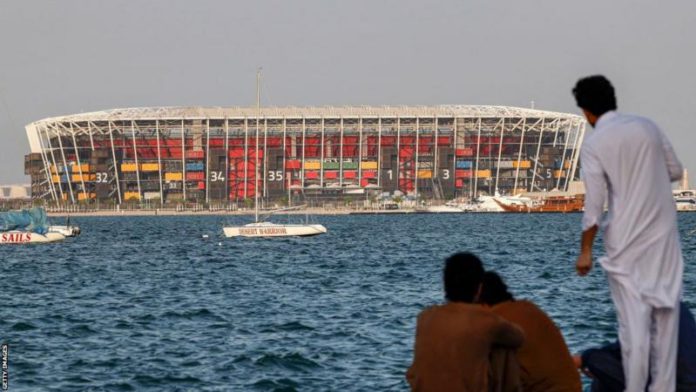“Inaction” by Qatar and Fifa on workers’ rights is “tainting the legacy” of the 2022 World Cup, according to Amnesty International.
Almost a year since the tournament began, the human rights group claims progress has “largely stalled”.
It says “remedy and justice for hundreds of thousands of workers who suffered abuses linked to the tournament remain elusive”.
In a new report titled ‘A Legacy in Jeopardy’, the organisation concludes that reforms have been “weakly-enforced” with abuses “still continuing”.
However, Qatar’s government responded by insisting that the World Cup “accelerated labour reforms, creating a significant and lasting tournament legacy”.
Fifa said it was “undeniable that significant progress has taken place”, but accepted that “heightened efforts are needed to ensure the reforms benefit all workers in the country”.
Controversy over the human cost of building the infrastructure required for the 2022 tournament in the gulf state’s extreme summer heat has hung over the event for years.
In 2021 it was revealed that 6,500 migrant workers from India, Pakistan, Nepal, Bangladesh and Sri Lanka had died in Qatar since it won its bid to host the World Cup in 2010.
However, the Qatari government said not all the deaths recorded were of people working on World Cup-related projects, and that many could have died from old age or other natural causes. Before the tournament, authorities claimed there had only been three ‘work-related’ deaths on actual stadium construction sites since work began in 2014.
But during the event, organisers said the number of migrant workers who died on World Cup-related projects was “between 400 and 500”.
Qatar had introduced labour reforms from 2017, with more protection for workers, a minimum wage, and the dismantling of the controversial ‘kafala’ sponsorship system, but there have been long-standing concerns over the implementation of the changes.
Despite pressure from campaigners and European football associations, as well as generating a record £6bn from the World Cup, Fifa resisted calls for a compensation fund for the families of workers who had died, instead setting up a ‘legacy fund’ directed at education.
Amid calls for the creation of a Migrant Worker Centre in Doha, Fifa President Gianni Infantino announced plans for a permanent office for the International Labour Organization – a UN agency.
‘Too little has been done’, Amnesty says
Amnesty acknowledges that it has learned from migrant workers that most can now leave the country freely, and noted advances in the enforcement of laws related to working in heat. But it said that “beyond this, [workers] painted a bleak picture of lost momentum and continued exploitation”.
“Qatar’s continued failure to properly enforce or strengthen its pre-World Cup labour reforms puts any potential legacy for workers in serious peril”, said Steve Cockburn, Amnesty International’s Head of Economic Social Justice.
“From illegal recruitment fees to unpaid wages, hundreds of thousands of migrant workers lost their money, health and even their lives while Fifa and Qatar tried to deflect and deny responsibility” he added.
“A year on from the tournament, too little has been done to right all these wrongs, but the workers who made the 2022 World Cup possible must not be forgotten.”
Amnesty said details of the promised tournament legacy fund “remain vague”, and that while workers no longer legally require a ‘no-objection certificate’ from employers to change jobs, in practice many must still secure some form of permission. It added that “huge barriers remain” for workers trying to access remedy through the justice system.
Fifa told BBC Sport it was conducting an independent assessment on “whether additional steps would be recommended in view of further strengthening the tournament’s legacy for migrant workers.”
“International experts and trade union representatives […] have repeatedly recognised that major steps forward have occurred in the labour rights sphere” it said.
“It is undeniable that significant progress has taken place, and it is equally clear that the enforcement of such transformative reforms takes time and that heightened efforts are needed to ensure the reforms benefit all workers in the country.”
Qatar insists upon ‘significant and lasting legacy’
In a statement, the Qatari government told the BBC: “The World Cup accelerated labour reforms in Qatar, creating a significant and lasting tournament legacy.
“Qatar now leads the region on workers’ rights and labour reforms, setting an example for other countries on how a system can be successfully overhauled.
“The region’s first non-discriminatory minimum wage, 97% of all salaries protected through the Wage Protection System, the removal of barriers to change jobs, a simplified complaints mechanism and easier access to justice, stricter enforcement including a crackdown on the payment of illegal recruitment fees, increased awareness of workers’ rights, region-leading health and safety standards on-site and in accommodations, and regular health screenings to identify underlying conditions.
“One year on from the World Cup, Qatar’s commitment to labour reform remains as strong as ever as we strive to establish a world-leading labour system.”

